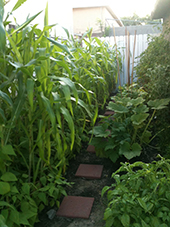Marisela Robles On Enriching Research Through Community Involvement
Marisela Robles is community liaison for Community Engagement at SC CTSI.
What do you do at SC CTSI and what do you like most about it?
The most rewarding aspect of my job is when I am able to connect investigators with community partners for the purpose of conducting meaningful research. It’s the kind of research that both explores a need identified in the community and advances science. In my role as community liaison, I enjoy creating awareness of the value of research in the community as well as the benefits of community involvement among researchers.

Marisela Robles
What’s something that people may not know about community engagement?
Community-engaged research is an approach that is not as commonly used as most would think. It takes a lot of time and relationship building. To find the right researcher for the right community partner or vice versa, there has to be a right and equal level of compatibility, willingness and chemistry. When it does happen, it really is exciting to know that we helped enrich research through community input and helped build community capacity to conduct research.
We have learned that for most projects to be successful, especially any new partnership, we need to provide support. My job also entails providing consultations to researchers and their team on strategies for working with the community to develop, adapt and translate their research tools as well as to help them collect and analyze the data.
If we can build partnerships between researchers and the community and create a venue for the community’s voice to be present in research, then we can be more successful at engaging both sides in meaningful, diversely representative and truly impactful studies.
What are the most critical problems faced by colleagues in your field? How do you think these problems could be addressed?
The community needs are as diverse as the county in which we live. Depending on whom you talk to – organizations serving Latinos, African Americans, Asians, mental health patients or the elderly – you hear about different needs. Some of the common threads and current challenges are the needs for program evaluation and evidence-based practices (EBP) that have been proven to work with ethnic populations.
These practices entail integrating the best available evidence with practitioner and community expertise to insure that the characteristics, needs, values and preferences of all of those who will be affected are addressed. This approach is crucial if we want to make a significant impact on LA’s growing diverse population where the “one-size-fits-all” approach is clearly not working.
Those who are using EBPs, however, find them restricting and difficult to use with their particular population, whether it be Latino, African American or Asian and Pacific Islander families. Additionally, many community organizations have developed their own models, programs and interventions but don’t have the capacity or resources to conduct an efficacy trial to validate their program. If we can build partnerships between researchers and the community and create a venue for the community’s voice to be present in research, then we can be more successful at engaging both sides in meaningful, diversely representative and truly impactful studies.
What do you do for recreation, or fun?
My husband and I have been married for almost three years. We enjoy watching movies, and more recently, we have taken up gardening. Last summer we planted our first garden. Some of our favorites were tomatoes, corn, squash, radish and our plentiful basil. This year we couldn’t wait to get started. It really is true, you don’t need a big space to plant a garden.

Marisela's garden
Learn more about the SC CTSI Community Engagement
The SC CTSI Spotlight series highlights the people that are part of SC CTSI at USC and CHLA. It provides us with the opportunity to learn about their work and perspectives. Thanks for sharing!
See related articles:



